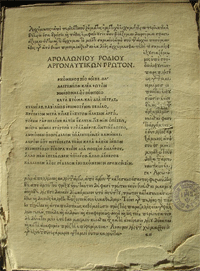

Giovanni Aurispa
Noto 1376 - Ferrara 1459
Giovanni Aurispa, one of the learned Italians of the 15th century, who did so much to promote the revival of the study of Greek in Italy, was born at Noto in Sicily. In 1418 he visited Constantinople, where he remained for some years, perfecting his knowledge of Greek and searching for ancient MSS. His efforts were rewarded by the acquisition of some 250 MSS., with which he returned to Venice. Here he is said to have been obliged to pawn his treasures for 50 gold florins to provide for his immediate wants. Cosimo de' Medici, hearing of his embarrassment, redeemed the MSS. and summoned the owner to Florence. In 1438, at the council of Basel, Aurispa attracted the attention of Pope Eugenius IV., who made him his secretary; he held a similar position under Nicholas V., who presented him to two lucrative abbacies. He died at Ferrara. Considering his long life and reputation Aurispa produced little: Latin translations of the commentary of Hierocles on the golden verses of Pythagoras (1474) and of Philisci Consolatoria ad Ciceronem from Dio Cassius (not published till 1510); and, according to Gesner, a translation of the works of Archimedes. Aurispa's reputation rests upon the extensive collection of MSS. copied and distributed by him, and his persistent efforts to revive and promote the study of ancient literature.
(1911 Encyclopedia Britannica)
Main works: Carteggio di Giovanni Aurispa, a cura di R. Sabbadini, Roma, Istituto storico italiano per il Medio Evo 1931.
Bibliography: E. Bigi, Aurispa, Giovanni, in Dizionario Biografico degli Italiani, vol. 4 (1962); A. Franceschini, Giovanni Aurispa e la sua biblioteca, Padova, Antenore 1976; S. Micciché, Giovanni Aurispa, umanista siciliano. Nuove ricerche bibliografiche con antologia di testi critici, Roma, Carocci Editore 2021.